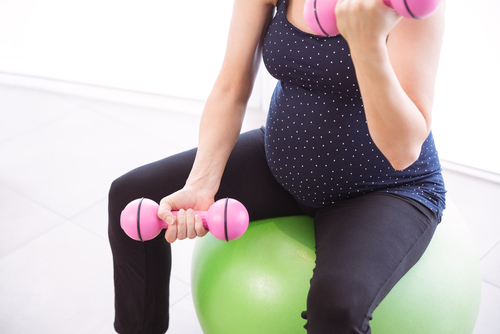
Jump to
Short answer
Working out while pregnant is not bad for you. In fact, exercising when you are pregnant is actually good for you. Contrary to popular belief, if you have a normal pregnancy, you can even start a low- to moderate- level exercise routine after a pregnancy has already begun. Always keep your doctor informed of your exercise habits during pregnancy.
Long answer
Just like when you are not pregnant, exercise during pregnancy is good for you. Sure there are things you should look out for, like drinking more than enough water and checking with your doctor, but overall, exercise during pregnancy has amazing benefits.
You should also approach exercise during pregnancy with caution. Although in healthy pregnancies most moderate exercise—even running and weight lifting—is perfectly safe, you should never lose sight of the extra burden on your body. Your blood volume increases by 50% during pregnancy, meaning that even when stationary, your heart is working overtime to circulate the extra blood. This is why moderate exercise is recommended—you want to keep your heart rate in a safe range.
That being said, it is even permissible to start a workout regimen after getting pregnant, as long as it is not too intense. Tell your doctor or other healthcare provider your plans for exercise, and once you start, keep it up.
Exercising during pregnancy has all kinds of benefits. It manages weight gain, helps to prevent gestational diabetes and preeclampsia, both dangerous but manageable conditions. Exercise can improve your mood, help you sleep, even reduce your increased susceptibility to aches in the body due to pregnancy. Pregnancy also is a time of gastrointestinal distress—flatulence, bloating, and constipation. Having a regular exercise program can ‘keep things moving’, reducing discomfort and perhaps embarrassment.
Exercise builds strength in your abdominal muscles, something you need for labor. It also trains your mind for childbirth because it develops endurance. Giving birth is an extremely physical event, and the physical exertion you expend is similar to running a marathon or completing a triathlon. It actually makes sense that you exercise during pregnancy to prepare for childbirth. In fact, the American Congress of Obstetricians and Gynecologists recommends that all women with normal pregnancies should work out for 30 minutes a day, most of the week!
In a good workout during pregnancy, you should make your goal be to raise your heart rate, stretch your muscles, and strengthen your muscles, all without causing strain on the baby. Don’t worry—your body will let you know if you are pushing yourself too far. You will become uncomfortably out of breath, perhaps even feel a bit lightheaded, which you should definitely take as a sign to reduce the intensity or take a break.
Starting or continuing a weightlifting routine is permissible during pregnancy, as long as you keep your workouts within a range of comfort for you and the baby. Lunges, which are often performed in this type of exercise are not dangerous, contrary to the timeless myth. They even tone the leg muscles in anticipation of labor. Light running is fine as well, keeping in mind that if you are new to it, start out slow and then build up to a full 30-minute jog. Sit-ups and crunches are actually fine for pregnancy, but they’re most practical in the first trimester when you have no bulging tummy; you’ll probably find them too difficult by the time you’re in the third trimester. If you listen to your body you will know exactly what your limits are. It is not the time to run your first marathon, but you certainly do not have to wait until after your delivery to exercise.
You should avoid sports that cause contact between bodies, such as soccer and football, and high-risk sports like scuba diving, horseback riding, skiing, snowboarding, and waterskiing. You should also view your bicycle with an air of caution, limiting use to stationary bikes. This is because once your uterus begins to bulge, you will lose your balance more easily as your center of gravity changes, resulting in falls.
You need to consult your physician before beginning an exercise routine in order to get an official green light. However, you can pretty much rely on the fact that if you are having a normal pregnancy, exercise is good-- even recommended, in order to have the healthiest pregnancy possible.
Possible short-term side effects
- lightheadedness
- shortness of breath
- fatigue

Benefits
- increased muscle tone
- increased endurance
- controlled weight gain
- help sleeping
- prevents pregnancy conditions like gestational diabetes and preeclampsia
- relieves aches and pains
- makes getting weight off after delivery easier
 Approved by
Approved by 














